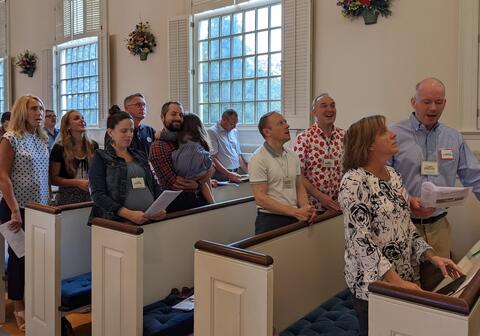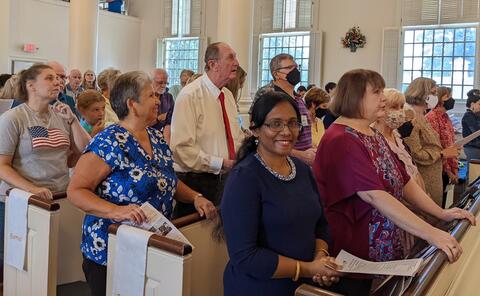Who We Are & What We Believe
Primary tabs

Statement of Faith
We believe in God, the Eternal Spirit, who is made known to us in our Lord Jesus Christ, and to whose deeds we testify:
God calls the worlds into being,
creates humankind in the divine image, and sets before us the ways of life and death.
God seeks in holy love to save all people from aimlessness and sin
God judges all humanity and all nations by that will of
righteousness declared through prophets and apostles.
In Jesus Christ, the man of Nazareth, our crucified and risen Lord,
God has come to us and shared our common lot, conquering sin and death and reconciling the whole creation to its Creator.
God bestows upon us the Holy Spirit,
creating and renewing the Church of Jesus Christ, binding in covenant faithful people of all ages, tongues and races.
God calls us into the Church
to accept the cost and joy of discipleship, to be servants in the service of the whole human family, to proclaim the gospel to all the world and resist the powers of evil, to share in Christ's baptism and eat at his table, to join him in his passion and victory.
God promises all who trust in the gospel
forgiveness of sins and fullness of grace, courage in the struggle for justice and peace, the presence of the Holy Spirit in trial and rejoicing, and eternal life in that kingdom which has no end.
Blessing and honor, glory and power be unto God. Amen.
Adapted from the Statement of Faith of the United Church of Christ, prepared by Robert V. Moss.

What We Believe

(The following was taken from a pamphlet published by United Church Press.) The description from the UCC Relationship page can be amplified by significant phrases commonly used by Christians, which express the commitments of the United Church of Christ.
That they may all be one (John 17:21)
This motto of the United Church of Christ reflects the spirit of unity on which the church is based and points toward future efforts to heal the divisions in the body of Christ. We are a uniting church as well as a united church.
In essentials unity, in nonessentials diversity, in all things charity
The unity that we seek requires neither an uncritical acceptance of any point of view nor a rigid formulation of doctrine. It does require mutual understanding and agreement as to which aspects of the Christian faith and life are essential. The unity of the church is not of it’s own making. It is a gift of God. But expressions of that unity are as diverse as there are individuals. The common thread that runs through all is love.
Testimonies of faith rather than test of faith
Because faith can be expressed in many different ways, the United Church of Christ has no formula that is a test of faith. Down through the centuries, however, Christians have shared their faith with one another through creeds, confessions, catechisms, and other statements of faith. Historic statements such as the Apostles' Creed, the Nicene Creed, the Heidelberg Catechism, the Evangelical Catechism, the Augsburg Confession, the Cambridge Platform and the Kansas City Statement of Faith are valued as authentic testimonies of faith. In 1959, the General Synod of the United Church of Christ adopted a statement of faith prepared especially for the United Church. Since that time a revision was made by Robert V. Moss, president of the United Church of Christ, 1969-76, and recommended for use by the Eleventh General Synod, 1977. Another revision, in the form of a Doxology, was affirmed by the Fourteenth General Synod (1981.) Both revisions use inclusive language.
There is yet more light and truth to break forth from God's Holy Word
This classic statement assumes the primacy of the Bible as a source for understanding the good news and as a foundation for all statements of faith. It recognizes that the Bible, though written in specific historical times and places, still speaks to us in our present condition. It declares that the study of the Scriptures is not limited by past interpretations but is to be pursued with expectancy for new insights and help for living today.
The priesthood of all believers
All members of the United Church of Christ are called to minister to others and to participate as equals in the common worship of God, each with direct access to the mercies of God through personal prayer and devotion. Recognition is given to those among us who have received special training in pastoral, priestly, educational and administrative functions, but these persons are regarded as ministers - servants- rather than as persons in authority. Their task is to guide, to instruct, and to enable all Christians to do the work of ministry rather than to do the work of ministry for us.
Responsible freedom
As individual members, we are free to believe and act in accordance with our perception of God's will for our lives. But we are called to live in a loving, covenantal relationship with one another - gathering in communities of faith, congregations of believers, and local churches. Each congregation or local church is free to act in accordance with the collective decisions of its members, guided by the working of the Spirit in the light of the Scriptures. But it is also called to live in a covenantal relationship with other congregations for the sharing of insights and for cooperative action. Likewise, associations of churches, conferences, the General Synod, and national boards and agencies of the United Church of Christ are free to act in their particular spheres of responsibility. Yet all are constrained by love to live in a covenantal relationship with one another and with the local churches in order to make manifest the unity of the body of Christ and thus to carry out God's mission in the world more effectively. The members, congregations, associations, conferences, General Synod and national instrumentalities are free in relation to the world. We affirm that the authority of God as revealed in Jesus Christ, and interpreted with the aid of the Holy Spirit, stands above and judges all human culture, institutions, and laws. But we recognize our calling both as individuals and as the church to live in the world:
• Ministering to its needs
• Contributing to the welfare of all
• Being enriched by those aspects of culture that help to make human life more human
• Working through institutions and supporting laws that reflect God's just and loving purposes for the world
• Seeking justice and liberation for all
This is the challenge of the United Church of Christ.

The UCC Relationship
The United Church of Christ acknowledges as its sole head, Jesus Christ, Son of God and Savior. It acknowledges as kindred in Christ all who share in this confession. It looks to the Word of God in the Scriptures, and to the presence and power of the Holy Spirit, to prosper its creative and redemptive work in the world. It claims as its own the faith of the historic Church expressed in the ancient creeds and reclaimed in the basic insights of the Protestant Reformers. It affirms the responsibility of the Church in each generation to make this faith its own in reality of worship, in honesty of thought and expression, and in purity of heart before God. In accordance with the teaching of our Lord and the practice prevailing among evangelical Christians, it recognizes two sacraments: Baptism and the Lord's Supper or Holy Communion.
Origins
The United Church of Christ came into being in 1957 with the union of two Protestant denominations: the Evangelical and Reformed Church and the Congregational Christian Churches. Each of these was, in turn, the result of a union of two earlier denominations. The Congregational Churches were organized when the Pilgrims of Plymouth Plantation (1620) and the Puritans of the Massachusetts Bay Colony (1629) acknowledged their essential unity in the Cambridge Platform of 1648. The Reformed Church in the United States traced its beginnings to congregations of German settlers in Pennsylvania founded from 1725 on. Later, its ranks were swelled by Reformed folk from Switzerland and other countries. The Christian Churches sprang up in the late 1700s and early 1800s in reaction to the theological and organizational rigidity of the Methodist, Presbyterian and Baptist Churches of the time. The Evangelical Synod of North American traced its beginning to an association of German Evangelical pastors in Missouri. This association, founded in 1840, reflected the 1817 union of Lutheran and Reformed churches in Germany. Through the years, members of other groups such as Native Americans, African Americans, Asian Americans, Volga Germans, Armenians, Hungarians, and Hispanic Americans have joined with the four earlier groups. Thus the United Church of Christ celebrates and continues a wide variety of traditions in its common life.
Characteristics
The characteristics of the United Church of Christ can be summarized in part by the key words in the names of the four denominations that formed our union: Christian, Reformed, Congregational and Evangelical.
• Christian
By our very name, the United Church of Christ, we declare ourselves to be a part of the body of Christ -- the Christian church. We continue the witness of the early disciples to the reality and power of the crucified and risen Christ, Jesus of Nazareth.
• Reformed
All four denominations arose from the tradition of the sixteenth-century Protestant Reformers: We confess the authority of one God. We affirm the primacy of the Scriptures, the doctrine of justification by faith, the priesthood of all believers, and the principle of Christian freedom. We celebrate two sacraments: baptism and the Lord's Supper or Holy Communion.
• Congregational
The basic unit of the United Church of Christ is the congregation. Members of each congregation covenant with one another and with God as revealed in Jesus Christ and empowered by the Holy Spirit. These congregations, in turn, exist in covenant relationships with one another to form larger structures for more effective work. Our covenanting emphasizes trustful relationships rather than legal agreements.
• Evangelical
The primary task of the church is the proclamation of the gospel, or evangel -- the good news of God's love revealed with power in Jesus Christ. We proclaim this gospel by word and deed to individual persons and to society. This proclamation is the heart of the liturgia -- the work of the people. We gather each Sunday for the worship of God, and through each week, we engage in the service of humankind.
Going Green
In 2013, First Church was named a Green Congregation by the United Church of Christ Connecticut Conference Environmental Ministry Team. To earn this distinction, First Church made more than two dozen improvements to our church, including replacing almost all incandescent bulbs with low energy bulbs, minimizing the use of Styrofoam products which do not decompose, shifting to organic lawn care, installing programmable thermostats, changing to high efficiency gas furnaces and low-flow water heaters, and installing motion sensor lights in most hallways and high-use rooms.
Christian Links
Below are links to United Church of Christ websites and a Christian Environmental Organization. These links are provided for informational purposes only, and do not necessarily represent an endorsement by First Church of the positions held or advocated on any website listed below.
• United Church of Christ Home Page
• Southern New England Conference of the UCC




